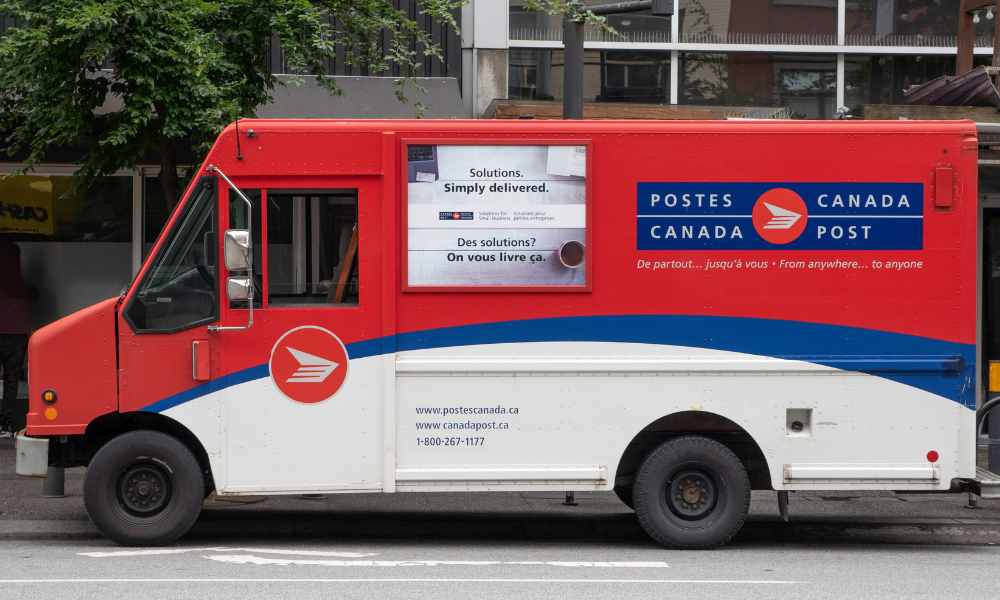Canada Post warns of major disruptions and deeper losses if workers strike starting May 23

Canada Post may face a nationwide strike starting May 23 after receiving formal notice from the Canadian Union of Postal Workers (CUPW).
The union cited concerns about potential changes to working conditions and the suspension of employee benefits, according to statements issued by both the union and the corporation.
As reported by The Globe and Mail, CUPW said the decision to issue a 72-hour strike notice was taken “in part to respond to the employer’s recent indication that it may unilaterally change working conditions and suspend employee benefits.”
The union said there is still time to return to negotiations and stated it remains committed to reaching collective agreements.
A strike would affect roughly 55,000 postal workers and disrupt delivery services to millions of households and businesses across Canada.
According to Canada Post, it handles 8.5 million letters and 1.1 million parcels each weekday and holds 29 percent of the parcel market.
Canada Post warned in its press release that a labour disruption would “have a lasting impact” on both customers and its already deteriorating financial situation.
The corporation has recorded more than $3bn in pre-tax losses since 2018 and is projecting another significant loss for 2024.
In January, it received a $1.034bn repayable loan from the federal government to continue operations, but its 2023 annual report stated at least $1bn more would be needed annually starting in 2026 to maintain services and employee obligations.
As per the Financial Post, if a national disruption occurs, mail and parcels will not be delivered and no new items will be accepted until the strike ends.
However, both Canada Post and CUPW have agreed to continue delivering socio-economic cheques and shipping live animals under specific arrangements during any disruption.
According to Canada Post, these arrangements are in place to ensure that payments to seniors and vulnerable Canadians are not interrupted.
The strike notice comes amid a breakdown in contract negotiations. As reported by The Globe and Mail, Canada Post temporarily paused talks last week due to a lack of progress, a move CUPW condemned as “reprehensible.”
The two parties last met on April 30, but no agreement was reached.
Earlier meetings in March also ended without a deal, with CUPW accusing the corporation of seeking “serious rollbacks” that would undermine full-time positions and expand part-time and temporary roles.
In parallel, a government-appointed Industrial Inquiry Commission (IIC) delivered a report on May 16 recommending sweeping reforms, including the phase-out of daily door-to-door letter delivery and the expansion of part-time roles to support parcel volumes.
The report, written by mediator William Kaplan and cited by Financial Post, stated that Canada Post was “effectively insolvent or bankrupt.”
Canada Post endorsed the findings, but CUPW said the report “skews heavily in favour of Canada Post’s positions.”
Ian Lee, associate professor at Carleton University’s Sprott School of Business and a former Canada Post employee, told The Globe and Mail that the union’s strike notice is “their way of saying, ‘We don’t accept the report.’”
Lee said Canada Post “burned through all their cash reserves and needed a bailout in January just to meet payroll,” and warned the corporation could run out of funds again this year.
“Canada Post is in an existential crisis,” he said. “There is no solution both sides will agree on.”
The Canadian Federation of Independent Business (CFIB) expressed concern about the strike’s potential impact on small businesses.
According to a May 15 statement cited by Financial Post, the 2023 strike cost businesses more than $1bn during the holiday season.
CFIB president Dan Kelly urged both parties to avoid a disruption, warning that small businesses already face economic uncertainty due to global trade tensions.
“If an agreement cannot be reached, government needs to use its legislative authority to maintain operations while it implements emergency reforms to address the long-term future of Canada Post,” Kelly said.
This would be the second strike in less than a year.
The previous work stoppage lasted 32 days in November and December 2023 and ended not through a resolution, but after the Canadian Industrial Relations Board (CIRB) ordered workers back on the job following a request by then-labour minister Steve MacKinnon.
That order extended the agreement to May 22 and initiated the IIC review process.
Stephanie Ross, associate professor of labour studies at McMaster University, told The Globe and Mail the timing of the potential strike in May may weaken the union’s position.
“The annual rhythms of when Canadians use the postal service coincide with Christmas,” she said. “Kicking the dispute down to May places it at a time when the union has less leverage.”



